Flexibility in Action: Navigating Life’s Twists with Grace

Happy Tuesday! Today’s quote is actually a proverb:
“Coincidence defeats a well-laid plan” (Filipino proverb)
While it may seem counterintuitive, this proverb carries profound wisdom that resonates with both our personal and professional experiences.
In our fast-paced world, we can often pride ourselves on meticulous planning and strategic thinking. We meticulously outline our goals, chart our course of action, and leave little room for deviation. However, despite our best efforts, life has a way of throwing unexpected curveballs our way.
Think about a time when you meticulously planned every detail of an event or project, only to have it derailed by an unforeseen coincidence or twist of fate. Perhaps it was a chance encounter that led to a serendipitous opportunity, or a random event that completely altered the trajectory of your plans. Whatever the case, these moments serve as powerful reminders that we are not always in control of our circumstances.
Real life can be fluid, and situations can change in manners we could never have imagined. Let’s face it; a global pandemic in 2020 was not on many people’s radar as a possibility. By necessity, many plans had to be altered, be they personal or business ones.
So, how do we reconcile the tension between planning for the future and embracing the uncertainty of the present? How do we navigate the delicate balance between intentionality and spontaneity in our coaching practice?
Flexibility and Adaptability
One approach is to adopt flexibility and adaptability. Instead of rigidly adhering to our plans, we can learn to embrace the unexpected and see coincidences as potential catalysts for growth and innovation. Rather than viewing them as obstacles to our success, we can reframe them as opportunities for learning and discovery. Or just look at them as the next step to complete.
Moreover, coincidences often have a way of revealing hidden patterns or connections that we may not have noticed before. They can serve as valuable clues or signposts that guide us toward new insights or directions. By remaining open and receptive to these synchronicities, we can tap into a deeper wisdom that transcends our logical reasoning.
In my coaching practice, I’ve seen firsthand the transformative power of embracing coincidence and spontaneity. Instead of viewing them as disruptive forces, I encourage my clients to see them as invitations to explore new possibilities and perspectives. By letting go of rigid expectations and embracing the flow of life, they often discover hidden opportunities and insights that lead to profound shifts in their thinking and behavior. When we think that something “should” happen a certain way, then it’s entirely possible we just aren’t thinking to look for other potentially easier or better routes, etc.
By the very conversational style of coaching, it lends itself to being flexible and adaptable. You may have an idea where the conversation is heading, but at any question, it may become obvious it needs to diverge in a different direction.
I’ve spoken to so many over the years who are just starting as a coach and feel that they should have the conversation fixed in their heads ahead of time. That they need to know all the questions that they “should” ask and have a plan for any technique, story, or exercise they think they may use during the session.
Clinging onto that belief, that way of thinking means that they also tell me that they feel pressure and tension. When they let go of that expectation and release that thinking, they find that they can relax into their coaching, and the conversation usually flows much more easily.
Of course, this is not to say that planning is irrelevant or unnecessary. Planning provides us with a sense of direction and purpose, helping us to stay focused and organized in pursuit of our goals. However, it’s essential to recognize that plans are not set in stone and that flexibility is key to navigating the complexities of life.
In conclusion, the proverb “Coincidence defeats a well-laid plan” reminds us of the inherent unpredictability of life and the importance of remaining open and adaptable in the face of uncertainty. By embracing coincidence as a natural part of the human experience, we can harness its transformative power and navigate life’s twists and turns with grace and resilience.
About Jen Waller

Jen Waller is on a mission to support, nurture and encourage coaching skills and talents from non-coach to coach and beyond.
As an experienced coach and trainer Jen is happy to utilise all skills at her disposal to assist clients from getting out of their own way and making a difference in the world with their coaching. Find out more about the support Jen offers here.

